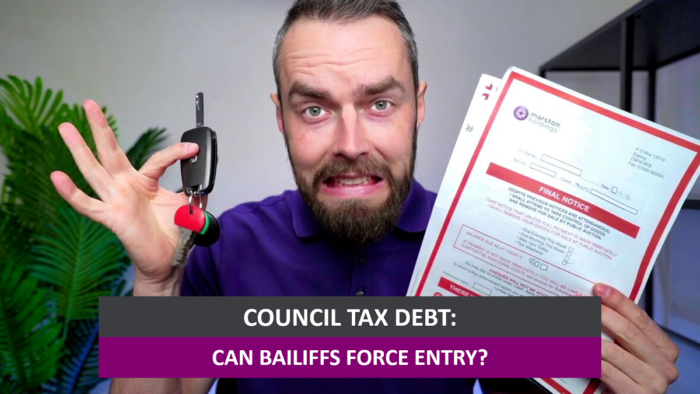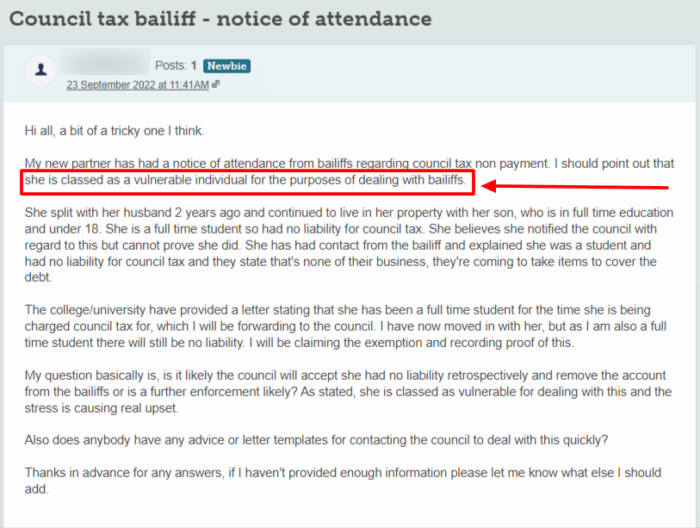Can Bailiffs Force Entry for Council Tax Debt?
For free & impartial money advice you can visit MoneyHelper. We work with The Debt Advice Service who provide information about your options. This isn’t a full fact-find, some debt solutions may not be suitable in all circumstances, ongoing fees might apply & your credit rating may be affected.

For free & impartial money advice you can visit MoneyHelper. We work with The Debt Advice Service who provide information about your options. This isn’t a full fact-find, some debt solutions may not be suitable in all circumstances, ongoing fees might apply & your credit rating may be affected.
Worried about not being able to pay your council tax? Nervous about what might happen? You’ve come to the right place for answers. Each month, over 170,000 people visit our website seeking guidance on their debt problems.
In this friendly guide, we will explain:
- What happens when you can’t pay your council tax.
- How to deal with council tax debt.
- What bailiffs can and can’t do.
- How to keep safe if bailiffs come to your home.
- And where to find more help if you need it.
We know it’s tough when you can’t pay your bills. But remember, you are not alone. There are ways to solve your problems and people who want to help.
Let’s get started and find some answers to your worries about council tax debt.
Can They Force Their Way into My Home?
» TAKE ACTION NOW: Fill out the short debt form
What Can They Take for Arrears?
There are strict rules on what bailiffs can’t remove from your property. These items include:
- Anything that belongs to someone else – this includes things that belong to your children
- Pets or service animals
- Vehicles, tools, or equipment that you need for your job or to study up to £1,350
- A mobility vehicle or any vehicle with a valid Blue Badge
- Anything permanently fitted to your home – kitchen units, etc.
Bailiffs also can’t take things that you need to live. These items can be anything that you use for your ‘basic domestic needs.’ They can take some of these things, but must leave you with:
- A table with enough chairs for everyone in your home
- Beds and bedding for everyone in your home
- A phone or mobile phone
- Any medicine or medical equipment that you need to care for someone
- A washing machine
- A cooker or microwave, and a fridge.
If you think that a bailiff has taken something that they shouldn’t, you need to complain immediately. I go through the complaints process below.
You can also contact a debt charity for some advice. I have listed several charities that offer free advice at the bottom of this page.
How a debt solution could help
Some debt solutions can:
- Stop nasty calls from creditors
- Freeze interest and charges
- Reduce your monthly payments
A few debt solutions can even result in writing off some of your debt.
Here’s an example:
Situation
| Monthly income | £2,504 |
| Monthly expenses | £2,345 |
| Total debt | £32,049 |
Monthly debt repayments
| Before | £587 |
| After | £158 |
£429 reduction in monthly payments
If you want to learn what debt solutions are available to you, click the button below to get started.
Will They Charge Me Fees?
Yes, a bailiff will charge fees. This will be added to the total value of your debt.
These fees are generally quite similar, and some bailiff charges are even standardised. County Court bailiffs, for example, have set fees of £75 for a Notice of Enforcement and £235 if they have to actually enforce the debt.
Keep in mind that the enforcement fee can be a bit higher. Usually, they will charge an extra 7.5% of your debt if that debt is over £1,000.
This means that if you have a debt of £1,500 that you don’t pay, you will be charged:
- £75 for Notice of Enforcement
- £235 for Enforcement
- £112.50 for the 7.5% over £1,000.
Total: £422.50.
Can They Enter Without My Permission Through an Open Door?
Thousands have already tackled their debt
Every day our partners, The Debt Advice Service, help people find out whether they can lower their repayments and finally tackle or write off some of their debt.

Natasha
I’d recommend this firm to anyone struggling with debt – my mind has been put to rest, all is getting sorted.
Reviews shown are for The Debt Advice Service.
What if I am a Vulnerable Person?
If you have received a Notice of Enforcement but think that you or whoever owes the debt is vulnerable, you should get some advice from a debt charity as soon as possible.

To be considered vulnerable, this forum user’s girlfriend must fall into one of these categories:
- Are disabled in any way or extremely ill
- Suffer from any kind of mental illness
- Have children or are pregnant
- Are under the age of 18 or over the age of 65
- Are dealing with a stressful situation such as the death of a loved one or unemployment
- Don’t speak English very well
You are also considered a vulnerable person if you fall into any of these groups. This means that any bailiffs will have to follow some additional rules to ensure their visit is as easy on you as possible.
Furthermore, if any of these conditions apply to you, you can get more time to deal with the Notice of Enforcement. You can also get more time if the Notice of Enforcement was not sent to you properly by the bailiffs or your council.
If you fall into any of the above categories, you need to either tell the bailiffs yourself or get a relative or carer to do it for you. You can then contact them by phone or by post. I have a free letter template that you can use to explain your situation.
When you speak to the bailiffs, you need to:
- Tell them that you’re vulnerable
- Explain why you would find dealing with bailiffs more difficult than other people in the same situation
- Ask them to stop any visits in the future because it will cause harm and distress to you
- Tell them if a letter or a visit could make your situation worse – this could be the case if you have a mental health problem or a heart condition, for example.
Make a note of what you agree with the bailiffs about future contact. This will make it easier to argue with them if they don’t stick to this new agreement, or if you need to make a complaint.
What Happens If I don’t have any Goods that They can Take?
How do I Complain?
If you think that your bailiff has been unreasonable or behaved inappropriately, you can make a complaint. You can also make a complaint if you feel that they have broken any of the Financial Conduct Authority’s (FCA) guidelines.
Make your first complaint to the bailiff’s company or agency so that they have the chance to sort out the issue themselves. If you feel that they have not taken your complaint seriously enough or have not addressed your issue properly, you can escalate matters.
You can make any secondary complaint to the Financial Ombudsman Service (FOS). They will investigate and, if your complaint is upheld, the bailiff’s company may be fined. You could even be owed compensation.
If the company that your bailiff works for is not registered with the FCA, you can make your secondary complaints to the Civil Enforcement Authority (CIVEA). CIVEA has its own set of guidelines and procedures for dealing with complaints against its members.


